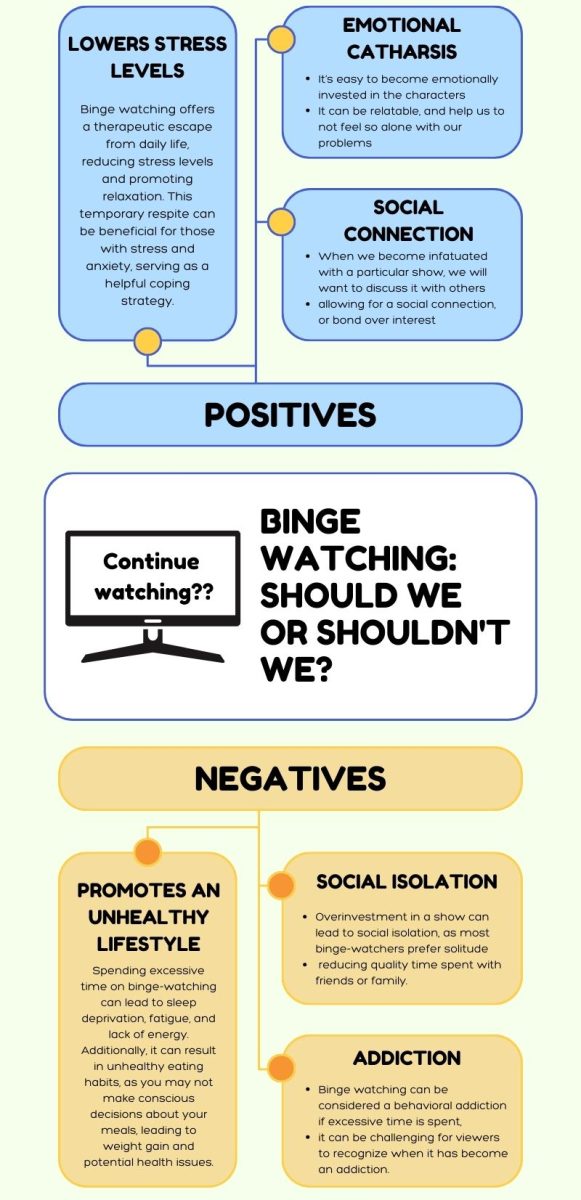Opinion: Binge-watching: The latest debate in entertainment

Binge-watching is one of the many ways to de-stress from a strenuous or tedious lifestyle. This escape from reality can be therapeutic in the sense that preoccupying ourselves with binge-watching can lower stress levels, as we indulge in captivating TV shows that momentarily remove us from the struggles of everyday life. A mental health article by Aura states, “This temporary respite can have a positive impact on our overall well-being by reducing stress levels and promoting relaxation.” And this activity can be a helpful coping strategy to those who have stress and anxiety.
Furthermore, the article mentions, “binge-watching can also serve as a form of emotional catharsis.” This experience is due to the emotional connection that can be formed by watching a show that personally resonates with us. Or we can become emotionally invested in a character’s journey through challenges, which can influence us to overcome our own challenges.
Another positive aspect of binge-watching is that it can provoke a broad social connection. When we find a character or show we can relate to, we tend to share this experience with our friends, family or anyone who is going through the same things as we are. This can form bonds over shared experiences and interests between people or groups.
While binge-watching can temporarily relieve stress , it can have negative effects. In contrast to the point stated earlier about binge watching evoking social connection, if one gets too invested in a show, it can lead to social isolation. Many binge-watchers prefer to watch TV shows in solitude, which can take away quality time with friends and family .
By spending a majority of your time on binge-watching, you could also potentially be missing out on sleep. According to an article on sleep irregularity due to binge watching by the University of Michigan, “higher binge-viewing frequency leads to poorer sleep quality, more fatigue and increased insomnia, while regular TV viewing does not.” This means that spending a lengthy amount of time binge-watching can permanently ruin your sleep schedule, leading to fatigue, lack of energy and more sleep deprivation issues.
Binge-watching can also be linked to unhealthy eating habits. When you’re relaxing on the couch in front of your TV, it’s likely that the meal you chose will be just any snack that is available, meaning that you are not making a conscious or healthy decision of what to eat. If you eat in this manner every day, you might start gaining weight and run the risk of developing linked health problems.
Additionally, a binge-watching experiment done by AKJournals concluded, “Most participants (6/7) acknowledged that TV series watching can become problematic and potentially have an addictive nature.” Binge-watching can be considered a behavioral addiction if you spend too much time on it, and in some cases, it is difficult for the viewers to even recognize when it has become an addiction.
Considering the positive and negative sides of this topic, watching shows in moderation is the most effective way to maintain a healthy lifestyle, while still prioritizing mental health and self-care. If you’re not too careful about balancing how much time you spend watching TV and socializing or being active, then binge-watching can become an addictive habit that can lead to health problems and social isolation. However, it is still equally as important to be vigilant about your mental health and well being, and making sure that you are setting aside time to give yourself a break as well.














